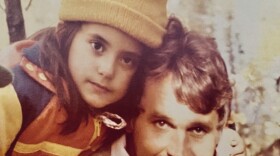UPDATE
Geraldine Brooks' appearance in Traverse City has been postponed due to illness. More details will be coming soon from the National Writers Series.
The new book “Memorial Days,” by Geraldine Brooks, begins with a phone call in 2019. A doctor at a hospital in Washington, D.C., tells Brooks that her husband had collapsed and died on a sidewalk.
Author and journalist Tony Horwitz was 60 years old and in seemingly good health.
Brooks alternates chapters between the bracing headwinds of facing a sudden loss and the work a few years later of taking a step back to process the grief.
She spoke with IPR’s Ed Ronco. Listen through the player above, or read some highlights below.
INTERVIEW HIGHLIGHTS
On the aftermath of Tony’s death: “I lived for three years just trying to be normal, pretending to be normal. Three years in, I realized it had all been a big act. I didn’t feel normal. I wasn’t right in the head. I thought ‘You need to do something drastic here. You need to get away from all the distractions and just do the work of grieving that you didn’t get a chance to do on that terrible day, because there were so many other things that you had to do.’ You have to catch all those balls that are falling out of the sky — all the things that Tony, my husband, did that kept our life on track. I had to figure out what they were and do them quickly so I could keep my sons safe and keep the structure of our life ticking over. And because of that I hadn’t allowed myself to ever really thoroughly sit with the loss I suffered.”

On processing grief when you can’t retreat from life for a while: “I was in a position of immense privilege. I’m very cognizant of that. One thing we can all do — to me, just writing it all down, because I’m a writer, that was what I did — but tell your story. Tell it to a friend. Tell it to a therapist. But just tell it, because it’s just so important to get it out there, to articulate it, or at least that helped me. … Everybody you love is going to die, and I think everybody will experience it differently. As a wonderful therapist put it, ‘We all have to climb down that mountain alone.’”
On talking to friends who have also felt loss: “I’m much less worried about saying the wrong thing. I used to avoid talking about loss with people who’d experienced it, because I didn’t know how to. And now I realize it doesn’t matter. It’s just important to reach out and say something. I think the worse thing is silence.”







